They moved to get some peace and quiet. A roaring North Texas bitcoin mine has ruined it
Nick and Virginia Browning wanted to die peacefully here. They are losing hope that will happen.
On the porch of the couple’s home on a sunny June morning, the scent of fresh biscuits and bacon pierces the summer air.
On the west corner of the porch, a white swing with the initials “N+J” carved into a heart shakes every so slightly.
Churning stacks loom less than a mile away and a low hum rattles their home, threatening the peaceful ending they hoped for in their lives.
The high school sweethearts have spent the last six and a half decades together. Nick, 82, worked in the oil field most of his professional career. Virginia, 81, was a school teacher most of hers.
The best retirement they could afford was a few acres in unincorporated Hood County and a small purple — yet well-insulated, according to Nick — home they built from scratch.
“We got a lot of sweat and blood in this place. We don’t want to give it away. We don’t want to quit. And we were hoping we could die right here,” Nick said.
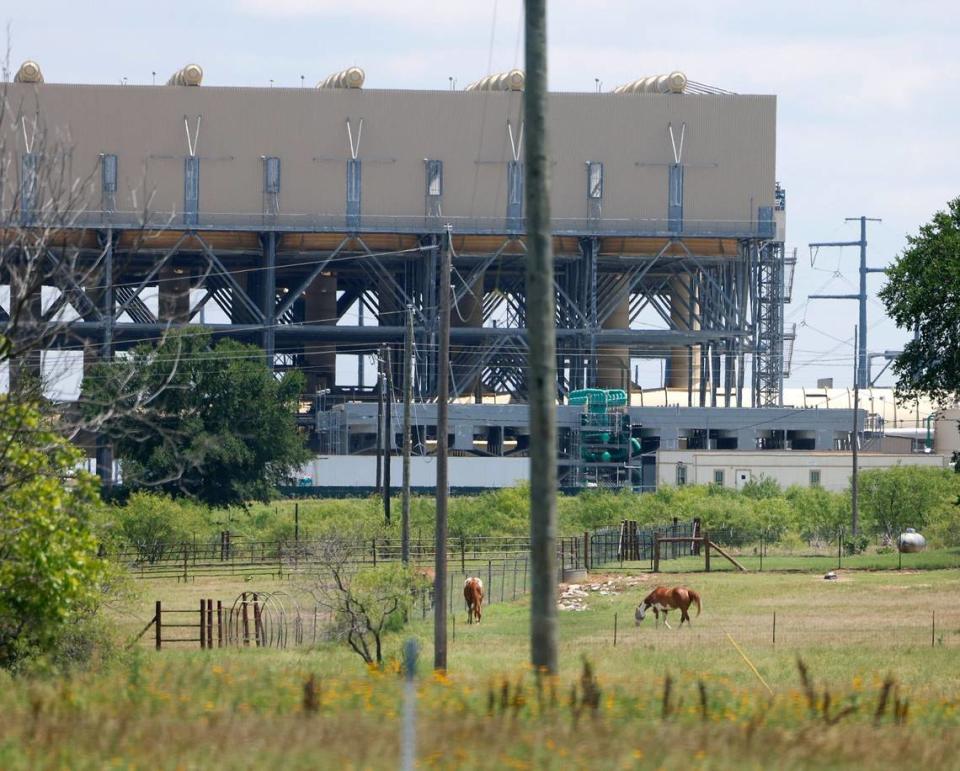
Over two years ago, a bitcoin mine and data center began operating, drawing energy from a neighboring power plant. For the past year and a half, the result has been noisy for everyone who lives nearby the plant, 10 miles southeast of Granbury in unincorporated Hood County.
The mining process creates bitcoins by solving complicated math problems that verify currency transactions. This requires heavy duty computers running 24 hours a day (worldwide mining consumed the same amount of energy as the Netherlands in 2022). As a result, these specialized computers generate a lot of heat that requires powerful cooling systems.
Neighbors blame the noise, up to 85 decibels (or the sound of a lawnmower or heavy traffic), for a host of health problems, from stress to high blood pressure and lost sleep. One family placed foam around their toddler’s bed to protect his ears.
Texas state law does not allow counties to regulate noise pollution, and the Texas Commission on Environmental Quality can’t either.
The bitcoin operation is owned by Florida-based Marathon Digital. It gets its power from the Wolf Hollow II natural gas station next door.
Nick and Virginia are among a dozen residents within a mile of the mine and data center who spoke to the Star-Telegram over the past month.
This is their story.
The mine moves in
None of the residents said they had any idea the mine was moving in or the noise it would create when construction began in 2021. Marathon Digital says it wasn’t aware of the noise problems when it took possession in December after the previous owner went bankrupt.
“Marathon inherited whatever these issues are because we weren’t the ones who built the site,” said Marathon Digital spokesperson Charlie Schumacher. “But now that we own it, it is on us to do everything we can. If there’s a problem, it’s on us to fix it.”
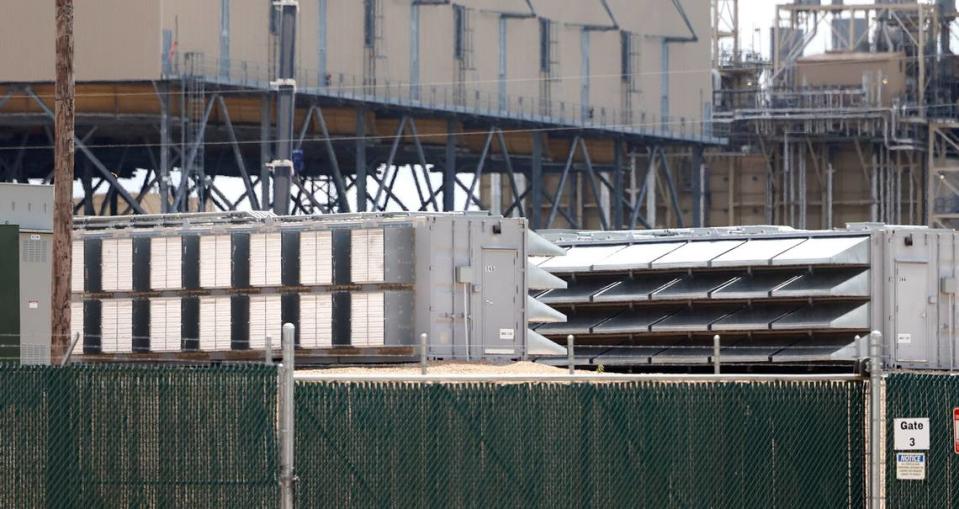
Hood County is the least remote of the company’s three operations in Texas, Schumacher said.
Hood County Constable John Shirley has been taking noise readings over the past few months, and has written over 30 citations for noise levels around the site at or over 85 decibels.
State law considers the 85-decibel limit to be the point at which noise is considered unreasonable. Unlike municipalities, counties can’t set noise ordinance levels.
“That 85 decibels limit is to protect against hearing loss,” said Joan Casey, an environmental epidemiologist and assistant professor at the University of Washington. “So that is a very high limit. It’s not a limit to protect against other health outcomes. The World Health Organization recommends 40 decibels or lower at night is protective of health, including sleep disturbances, mental health problems, cognitive impairment in kids, that sort of thing.”
Health issues emerge
Nick and Virginia believe their new health issues have nothing to do with their age. Nick said he’s been to the doctor more often during the past year and has had to take more medicine to keep his health in order.
“I used to be just as tough as a boot and I don’t think age is what the problem is because some of my people live to be 95 years old and are still going strong,” Nick said.
Larry Potts, a retired pastor who spent four decades as a missionary and preacher, said the hum of the mine has caused a constant stress on him and his family.
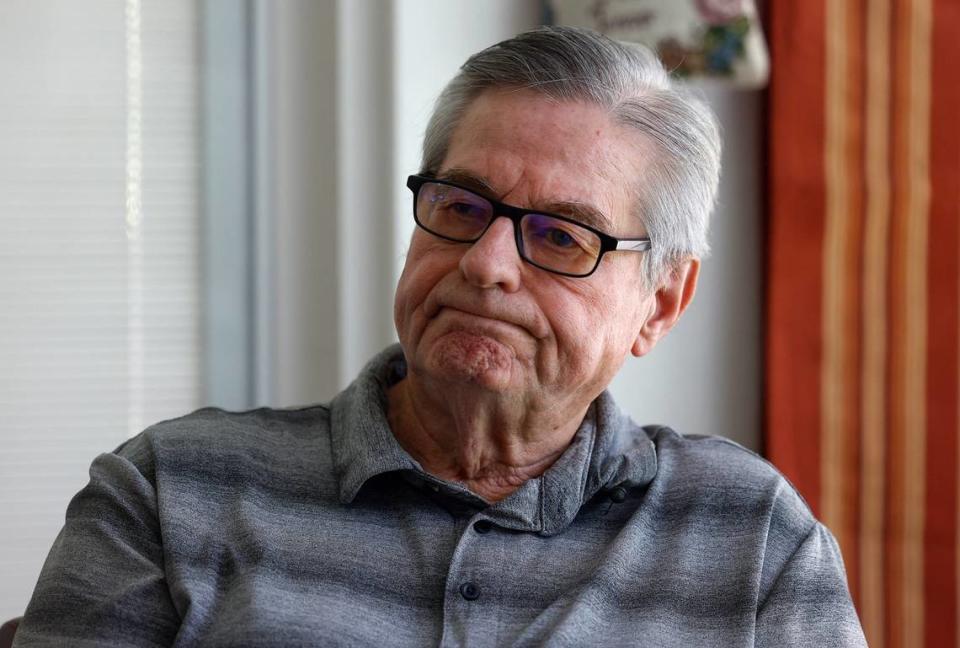
He said when he suffered a “heart block” last year, he laid down and told his wife she should just let him die because of the stress caused by the nonstop noise.
Potts added he has no problem with the bitcoin mine being there. He just wishes it was quieter.
Down the road from Potts, Daniel and Deanna Lakey said the noise forced her son’s family to move.
Deanna, a registered cardiovascular nurse, spoke to the Hood County commissioners on June 11. Her husband helped her to the podium because of her vertigo. She told commissioners she is bedridden because of the worsening condition.
She and her husband built a mobile home for her son’s family but the couple had to move to Missouri because of excessive ear infections plaguing their children, a 9-month-old and a 2-year-old.
“I had my grandchildren next door. It was a dream come true,” Deanna said. “I’ve already lost part of my family.”
Daniel said he tried to help his 2-year-old grandson by placing a layer of foam around his bed.
“We put that between him in the wall because he would wake up and say ‘mama loud, mama loud.’” Daniel said. “Everywhere else in the room, it was still loud. But when he was sleeping, it seemed to help him sleep.”
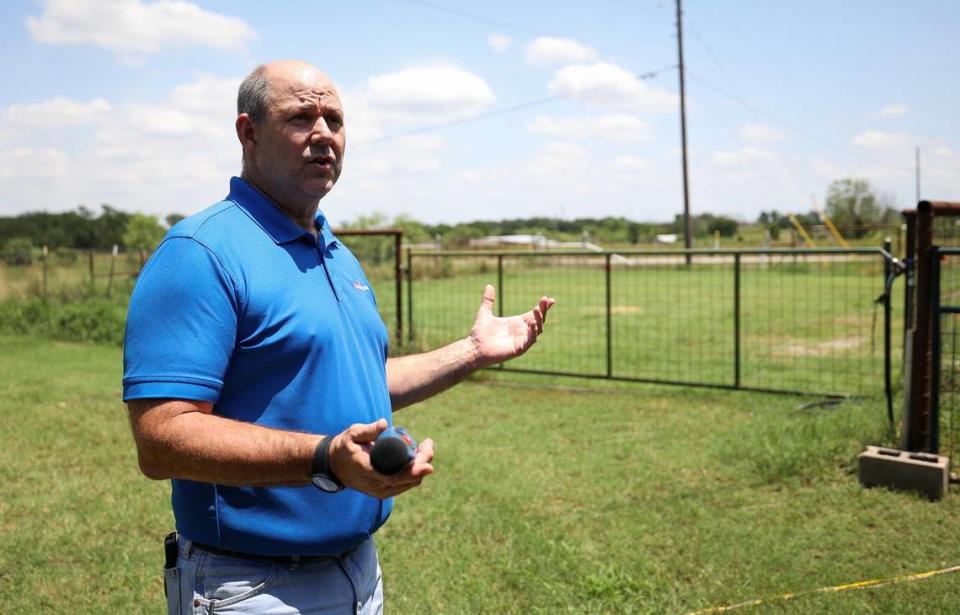
But it wasn’t enough to keep their grandchildren there, which hurt Daniel and Deanna, who moved to Hood County for peace and quiet and to be near family.
“What do you do? You know, we don’t have the luxury of moving,” Daniel said. “We sold everything we had in Arlington, moved out to the country, and put everything we had into this property. And we spent quite a bit of money.”
Lakey’s neighbor, Cheryl Shadden, a nurse anesthetist, has been perhaps the most vocal opponent of the mine.
Multiple signs around her property read “No! Bitcoin Noise” and “Bitcoin Sux.” The unused wood lying around her property will be used to make more signs.
Shadden, a self-described “cowgirl hippie,” walks into her home, followed by eight matted fur, cream-colored great Pyrenees.
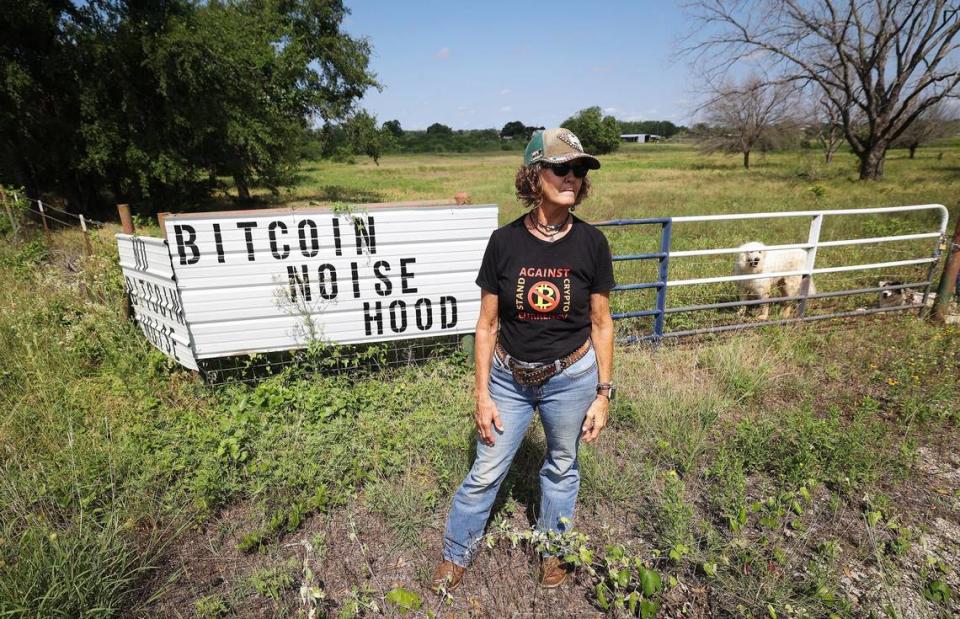
Shadden lives across the street from Wolf Hollow II and says that when she wakes up at 3 a.m. for work, she sees steam coming from the plant’s stacks, and the sound from the mine and data center is at its loudest.
A mobile home park sits even closer to the mine on the other side of the highway.
Those closest to the mine seem to be some of the least concerned with the noise.
The Star-Telegram spoke to several residents, almost all of whom said the noise was not a primary concern.
Agustin Herrera said he has lived there for five years, and the noise is worse at night and keeps his wife up. However, he said noise levels have decreased slightly since a 20-foot wall was built around the operation.
Kris Shelby, who has lived in a trailer for 12 years, said he has gotten used to the noise. He also said he believes the mine owners are trying to quiet the operation.
A father and son who have lived in their mobile home for almost a year — whom the Star-Telegram is not naming due to their citizenship status — said they’ve heard the noise but it doesn’t affect their family much.
“We could hear it more before they put the wall up, but yeah, we still hear it,” the father said but added, “When the wind is coming this way, it’s much louder.”
His son, who has a 4-month-old, said the noise from the mine is “going almost all the time” but hasn’t seen that it affects the baby. He added that his wife doesn’t complain about the noise either.
“Really, it doesn’t bother me that much,” he said.
The family has been in the U.S. for almost a year, moving from Guanajuato, a city in Mexico plagued by cartel violence.
But one woman who lives a few hundred yards from the mine kept her lights dim on a recent day because of a headache she blamed on the noise humming through the walls of her house.
“I don’t really know when it first started but I know last year around August is when my ears started ringing, didn’t stop,” said Geraldine Lathers.
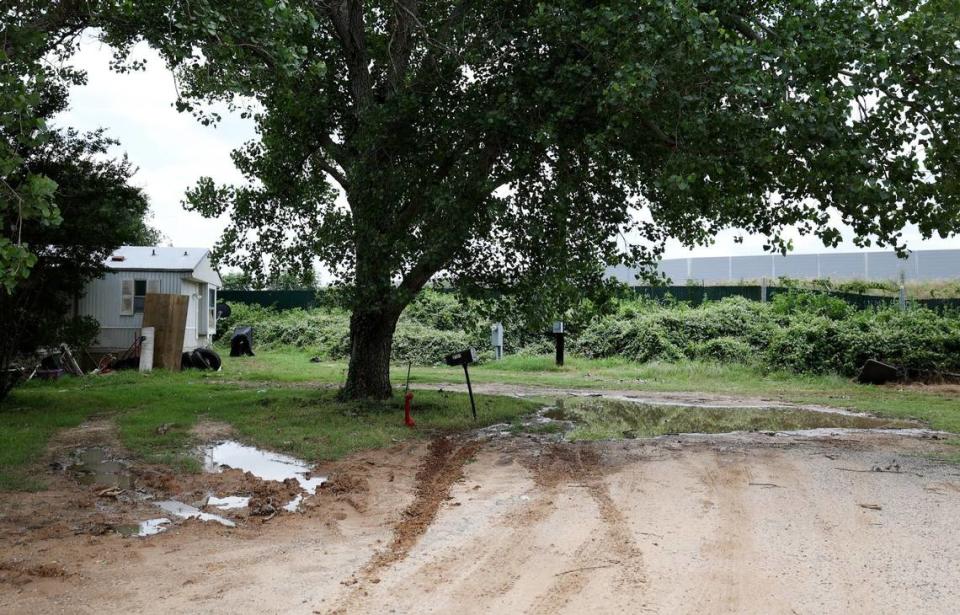
Lathers has faced adversity over the last decade, losing her husband and two children. But the noise from the plant over the last year has exaggerated the pain she feels every day.
Lathers said she began taking medication for anxiety after her son died, but the stress from constant noise has made it worse.
She also said doctors and nurses have told her there isn’t a correlation between the mine and her health issues but have advised her to move. Lathers said she responded to one doctor who made the recommendation by saying, “Where the hell do you think I’m going to go?”
Lathers can’t afford to move, but even if she could, she wouldn’t because she doesn’t want to pawn the problem off to someone else.
Tom Weeks is retired and has lived in Hood County for 27 years. He moved from Fort Worth to enjoy the solitude of the country. He spends much of his time painting in an old school bus behind his house.
He said he hadn’t had a good night’s sleep in a year and pointed to a collection of several opaque orange medicine bottles on his kitchen counter. He said he’s had high blood pressure his entire life, but he’s never had to take this much medicine.

While he speaks and shows off his paintings that line the walls, the low hum from the mine a quarter mile away ripples through his well-insulated home he built himself, and the liquid in half-empty vodka bottles vibrates.
Weeks’ 9-pound Chihuahua rescue, Jack, has also felt the effects of the low hum, so much so that Weeks said he now gives him Gabapentin for his anxiety.
But Weeks acknowledges he is well off enough financially to move and worries more about his older neighbors.
“You got people here that are absolutely trapped,” he said. “There’s so many people here that are on Social Security,” Weeks said.
He believes the site was chosen because of the socioeconomic status of the residents — and the lack of regulation.
“There’s a lot of good people around here. Their only sin is they’re poor ...” Weeks said. “I don’t think this thing would even be an issue if it weren’t being heard as far as Pecan Plantation.”
Pecan Plantation
Eight miles away, a little over five miles “as the crow flies,” Pecan Plantation could not be more different then the areas directly surrounding Wolf Hollow II. But they’re unified by the noise.
The gated community is made up of multiple neighborhoods, including The Landings Airpark at Pecan Plantation, which features homes with airplane hangars and taxiway among the neighborhood.
One resident uses his plane to monitor the activities at Wolf Hollow II.
Over the last few months, Brad Peden has taken photos of the mine and data center to understand what’s happening. He sees new containers and worries about an expansion.
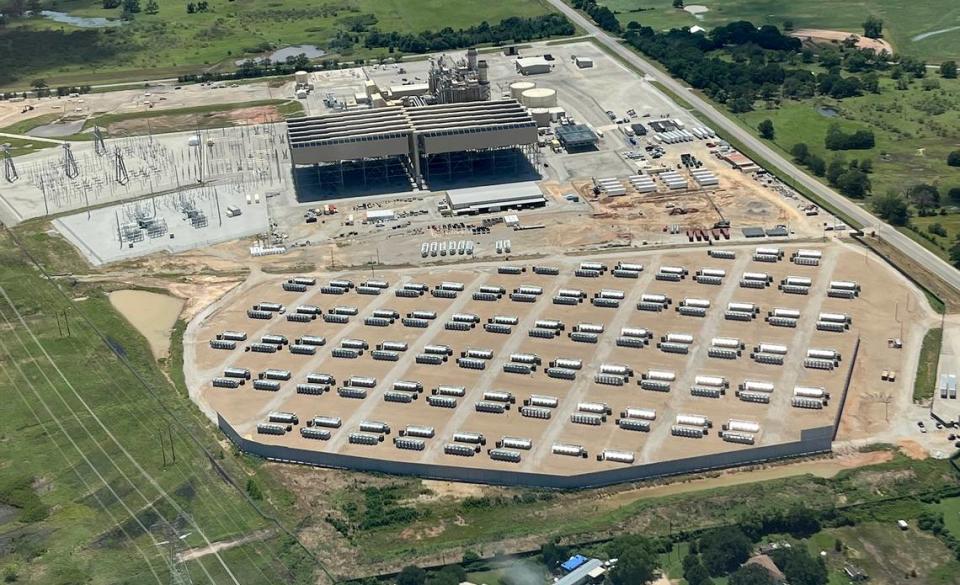
A Marathon Digital spokesperson said the company is not expanding but rather installing some equipment in hopes of muffling the hum.
Peden moved to The Landings Airpark in 2018 to enjoy his retirement. He now wears earmuffs at night to block the noise from the mine.
Down the street from him in a white 1980s home with soaring curved glass block windows and bright red roof overlooking the Brazos River, Cindy and John Highsmith are on the front lines of the fight.
The couple founded Trendgreen Associates, an environmental services company based out of Sugar Land, and moved to Hood County when they retired.
They have been instrumental in organizing residents near the plant to speak up at Commissioners Court, attend town halls and talk to the press.
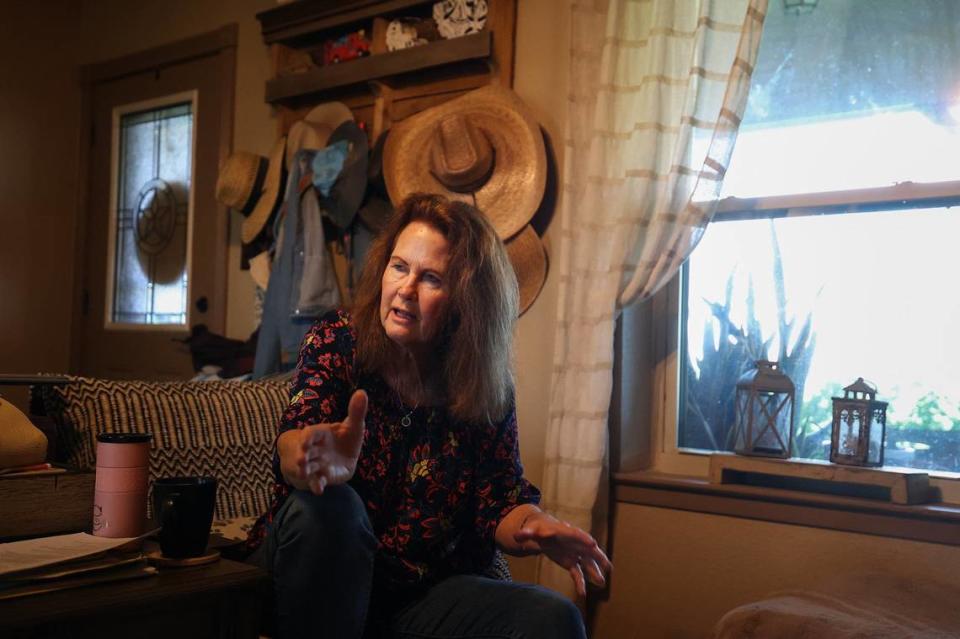
However, the couple has concerns about the effects the data center and mine will have on the surrounding area.
Cindy became increasingly concerned about what was happening at Wolf Hollow II at the beginning of this year when a Texas Commission on Environmental Quality notice was posted in the Hood County News.
The notice alerted residents to an application from Wolf Hollow II to build eight natural gas-fired simple cycle turbines that will emit pollutants, sulfur dioxide and greenhouse gases.
A spokesperson for Marathon Digital said the company is “52 to 54% sustainably powered” and renewable energy sources are used whenever possible but called Wolf Hollow II an exception.
While residents have concerns about the plant’s polluting potential, the plant has been in compliance since 2018 and has only one violation, a permit problem in 2021, according to records from TCEQ.
The plant is also mostly in compliance with EPA standards, with the exception of the first seven months of last year, when it fell out of compliance with the federal agency over the Clean Water Act for turning in a report late.
TCEQ said it can’t do anything about noise pollution.
“The TCEQ does not have authority under the Texas Clean Air Act to require or enforce any noise abatement measures. Noise ordinances are normally enacted by cities or counties and enforced by local law enforcement authorities, a spokesperson for the agency said. “The public should contact their local authorities with questions or complaints about noise.”
Marathon Digital’s electric company, Constellation Energy, declined an interview but said in a statement it is “committed to being a good neighbor and has a strong track record of supporting Granbury, Hood County and other communities where we live and work” and added “While Constellation does not control the bitcoin facility operations, we will continue working closely with Marathon as they take actions to reduce their impacts and to keep neighbors and local officials informed.”
Politics at play
China banned crypto trading and mining in 2021, New York partially banned bitcoin mining in late 2022, and in May, Arkansas placed restrictions on the noise levels of bitcoin mining operations.
But over the past couple of years Texas leaders have invited bitcoin mining into the state. Fort Worth became the first U.S. city to have a bitcoin mine. Gov. Greg Abbott invited miners to come to Texas in 2022 and Sen. Ted Cruz wrote in a May post on X that he was investing in bitcoin miners.
I just bought 3 Bitcoin miners that started hashing today in Iraan, TX.
I’m proud to join the ranks of Texas #BITCOIN miners! pic.twitter.com/kALhVGy13l— Ted Cruz (@tedcruz) May 31, 2024
Hood County residents said they have written to their state lawmakers about the issue: Sen. Brian Birdwell and Rep. Shelby Slawson.
Birdwell did not respond to a request for comment. Slawson provided a statement on the matter.
“We take very seriously the complaints from constituents about the noise and disruption to the peaceful enjoyment of their homes and will continue working with citizens and local officials to push the operator to find noise mitigation solutions,” a spokesperson told the Star-Telegram.
However, a Hood County commissioner wants to change the unregulated market for crypto mining in Texas.
In San Antonio, dressed in sparkling red, including a hat, Hood County Commissioner Nannette Samuelson stepped out of a session at the Texas GOP convention to speak about the issues facing her constituents.
Samuelson wanted to add legislation to the party’s policy priorities that would require owners of bitcoin mining facilities to maintain a 20-mile distance from homes or neighborhoods.
After waiting hours in line to speak and have the item added, Samuelson did not get a chance.
Samuelson has hosted four town halls about the mine since she took office in 2023.
Three weeks later after the GOP convention, Samuelson was back in Granbury for Commissioners Court, where some residents spoke about their declining property values and asked for a study about the noise.
Samuelson echoed constituents’ calls and recommended the study to Hood County Attorney Matt Mills.
“You do an independent sound study and the study comes back and says, ‘Oh the sound’s really bad’ OK. Well, now what?” Mills said.
Someone in the crowd yelled “Take it to the state” in response. Mills rebutted.
“Well, I mean, they know the sound is bad,” he said. “They’ve all attested to that. But if you have an independent sound study, and some professional engineer comes and says, ‘Boy, this sounds really bad.’ OK, what is the county going to do then?”
After a 10-minute discussion, commissioners voted unanimously table the item until their next meeting on June 25.
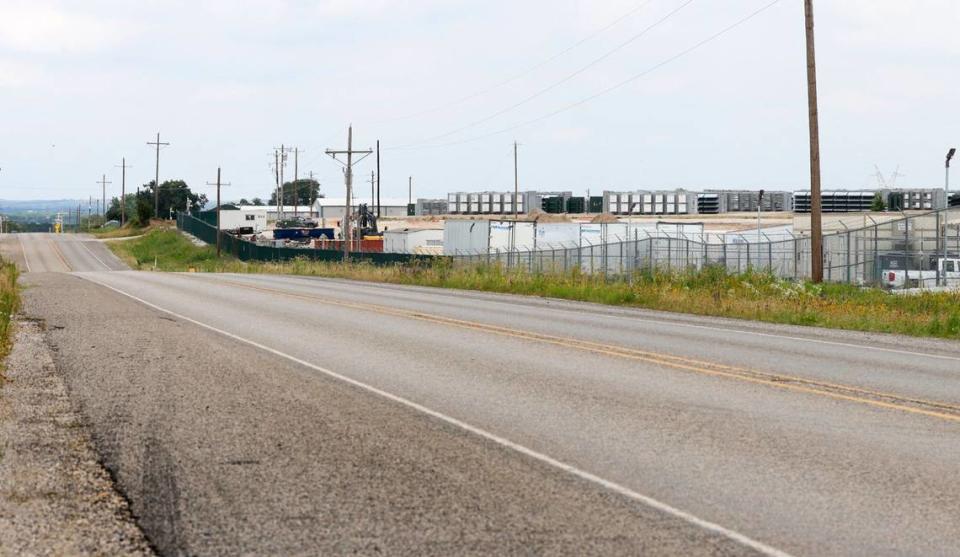
On June 12, ERCOT CEO Pablos Vegas testified to the state’s Senate Committee on Business & Commerce, alerting members that bitcoin miners were putting a strain on the state’s power grid and told them that the grid would have to double the amount of energy it provides by 2030 to continue supporting the industry.
After the testimony, Lt. Gov. Dan Patrick posted on X that “Texans will ultimately pay the price. I’m more interested in building the grid to service customers in their homes. ... We want data centers, but it can’t be the Wild Wild West of data centers and crypto miners crashing our grid and turning the lights off.”
ERCOT CEO Pablo Vegas and others gave shocking testimony today in the Senate Committee on Business & Commerce that within only six years (that’s only three legislative sessions), our power grid needs will grow from about 85,000 to 150,000 megawatts. That is much higher than the…
— Office of the Lieutenant Governor Dan Patrick (@LtGovTX) June 12, 2024
‘Continuous violation of law’
After the constituents’ complaints, Shirley, the constable, purchased a decibel reader. He said he took readings and waited six months before writing the first citation.
“I figured the best way for me to get the attention of, honestly, the government system, hopefully leading to the legislative branch, is to potentially show that you’ve got an operation and continuous violation of law,” Shirley said. “I’m arguing that they’re potentially violating law all the time, or almost all the time.”
While he has been following the letter of the law for sound violations, 85 decibels, he criticized the threshold.
Based on a 1974 study, the Environmental Protection Agency recommends an exposure limit of 70 decibels or less over 24 hours to prevent hearing loss. OSHA recommends workplace noise levels below 85 decibels.
“Legislators shouldn’t be lazy and rest upon 50-year-old EPA studies that, in my opinion, are not necessarily even applicable or relevant to what we’re addressing today” Shirley said. “Step up to the plate and be willing to write some laws specifically to address these corporations that you invited here.”
Staff Writer Cody Copeland contributed to this report.

